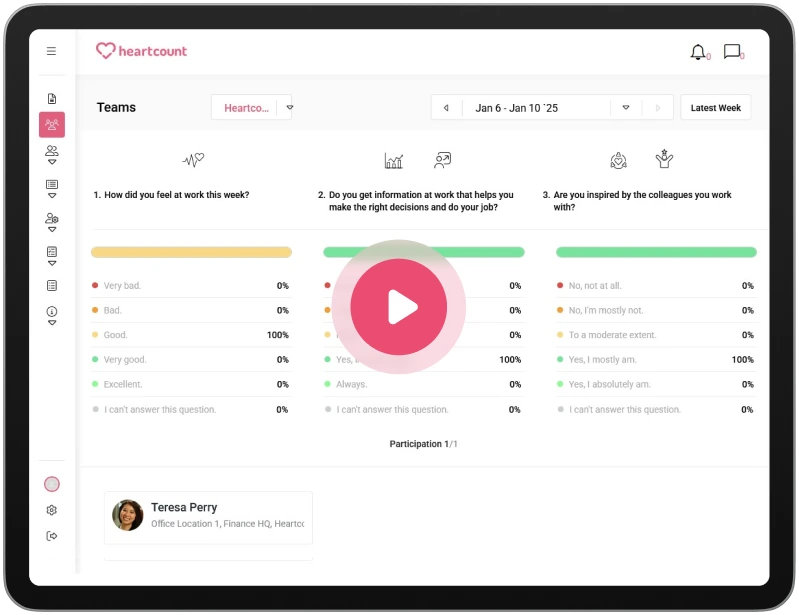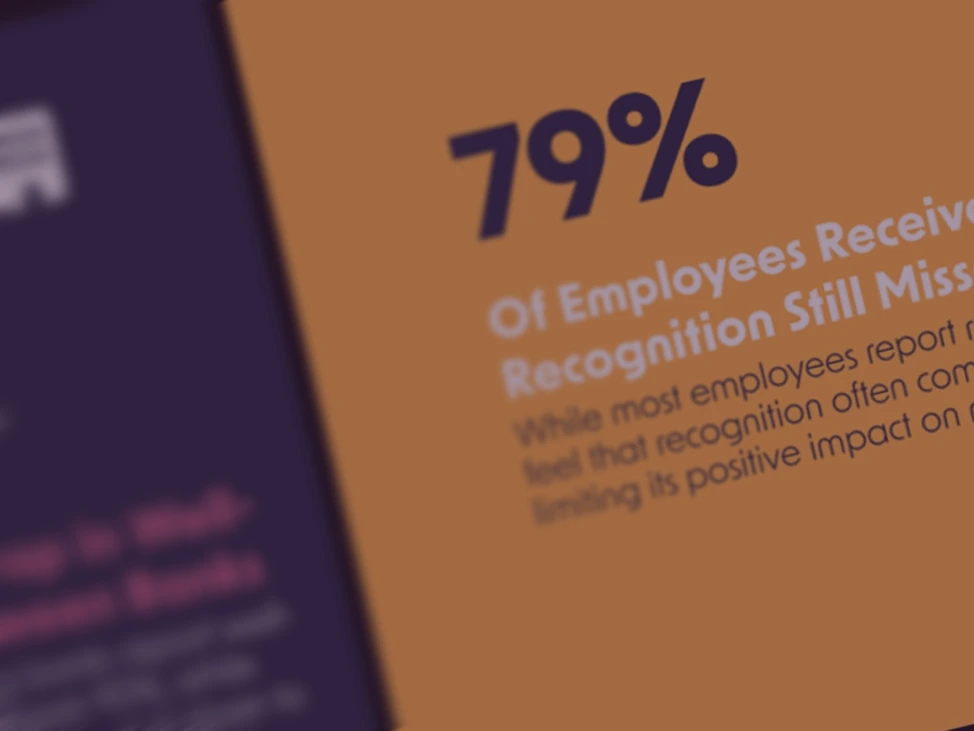Webinar Impressions: How to Use Data To Improve Business Performance – Best Practices

Improve business performance with HeartCount. During our last webinar we had a chance to hear some business practices regarding the usage of data in the IT industry. Our moderator, Aleksandra Radujko, Human Value Manager at Emakina RS, took it upon herself to make the whole process a little bit more fun, while still maintaining the educational aspect. Our amazing guests, Tamara Jokanović from Represent Communications and Ivana Canić from Strauss Adriatic, Anne van der Heide, Happiness Officer for Bizzomate, and Vuk Popović, Group CIO at Argus Data Insights shared with us what the data means to them and what are the benefits of using the right data at the right time. To find out more about their best practices, continue reading!
To watch the whole webinar, visit our YouTube channel.
-
1.How did HeartCount help you and what other numbers do you use in your work?
-
2.What is the biggest benefit of using data to improve business performance?
-
3.What’s your experience with team reports?
-
4.3 key things to consider when it comes to data, based on the Bizzomate’s business practices:
-
5.3 things to take from Argus Data Insight’s business practices when it comes to data:
Improve business performance with HeartCount. During our last webinar we had a chance to hear some business practices regarding the usage of data in the IT industry. Our moderator, Aleksandra Radujko, Human Value Manager at Emakina RS, took it upon herself to make the whole process a little bit more fun, while still maintaining the educational aspect. Our amazing guests, Tamara Jokanović from Represent Communications and Ivana Canić from Strauss Adriatic, Anne van der Heide, Happiness Officer for Bizzomate, and Vuk Popović, Group CIO at Argus Data Insights shared with us what the data means to them and what are the benefits of using the right data at the right time. To find out more about their best practices, continue reading!
To watch the whole webinar, visit our YouTube channel.
How did HeartCount help you and what other numbers do you use in your work?
- Ivana: Besides the general numbers that all companies follow, we also measure the turnover rate in the first year, engagement rate and many other things. HeartCount brought a different type of numbers into perspective, so now we can see what’s happening within our company timely and in more detail. Shortly, it shows what might be the cause of a certain problem and what is the adequate solution. Numbers help us focus our energy on things that matter more efficiently.
- Tamara: We managed to get insights into what bothers people the most. Due to the Covid-19 situation, we had to find a way to stay connected. And that’s what HeartCount helped us do. It was one place where we all “met”.
What is the biggest benefit of using data to improve business performance?
- Tamara: For us, it’s definitely the fact that we can get a closer look into each of our employees’ emotional and mental state at work. Why someone feels bad, if they have enough energy for day-to-day activities, and similar. In moments like this, it’s very important to notice change early and react as soon as possible before it turns into something bigger and more complex. Of course, at first we weren’t sure about the response rate and how people would react. The industry we’re in is pretty specific and the fluctuation of employees can be a big problem. Also the scope of work sometimes leaves us with no time to talk to people directly. Now it’s simply not an option to say that we didn’t know. We can always find out what bothers them and there are no excuses for not doing it on time.
- Ivana: I have to agree with Tamara on this one – there is no excuse. HeartCount tool gives as an opportunity to act timely. You get to see what’s happening on a weekly basis. Of course, we also weren’t sure how people would feel about using the tool due to the specifics of our industry. But it turned out that the people who we thought might dislike it ended up using it the most. When it comes to data, it’s not just about what’s not working and what’s bad — it’s also about reflecting on the things we did well. It’s a communication channel in a way, and it leaves people enough space to share their suggestions with us. Also, it leaves employees no space to say that they didn’t have a chance to express their thoughts. So, no excuses both ways.
COLLECT
What’s your experience with team reports?
- Tamara: We also have a variety of different teams. We thought the PR team would be the most active one, considering the nature of their job. But we also wanted the rest of the teams to get involved. Designers, translators, and other teams that didn’t work from our offices. Giving those people a chance to share their thoughts on the one hand, and giving us an opportunity to connect with them, on the other hand. It definitely helped me understand the climate in each team, without having any previous experience working in those fields.
- Ivana: Team reports are really important for us. We see the biggest benefit of HeartCount in its ability to monitor how our new leaders are doing, especially because of the responsibility that comes with this role. HeartCount is an opportunity for us to help them.
3 key things to consider when it comes to data, based on the Bizzomate’s business practices:
- Recognize the importance of taking care of your people
The core of every company’s success is its people. Before delving into the topic of improving business practices and bringing value to the organization, companies must be people oriented. This is especially important when it comes to the IT industry due to the high demand in this field. As Anne pointed out: “Once somebody is in and you like them it’s extremely important to keep them.”
From lunch to the feeling of purpose. Career paths, performance cycles and everything in between. It is crucial for the company to take care of their people.
- Have a short connection with people and low threshold for them to reach out to you
Bizzomate introduced HeartCount to its employees in the middle of Covid-19 situation. Having a breakdown of their week through a 3-question-long questionnaire lowered a threshold for employees to reach out in need of support.. It was as simple as marking the “not so good” option. This also meant that it was possible to quantify and measure the results of the survey and extract the right data to act on.
- Customize the questions around specific content
One of HeartCount’s features is its ability to import customized questions, molded into current needs of your company. This gives us insights into real-time information about how your people feel about their work. Nonetheless, it doesn’t replace the importance of face-to-face communication, but it’s easier to approach people and act on time.
Our other guest speaker was Vuk Popović from Argus Data Insights. Vuk’s IT department was the first one that introduced HeartCount to its people a year and a half ago, following other departments after a while.
3 things to take from Argus Data Insight’s business practices when it comes to data:
- Collecting the data gives you space and time to adapt to new situations
Reacting in a timely manner is one of the most important things in the business world. Being proactive and thinking a few steps ahead is the way to go every time you have the right information to do so. So, make sure to collect as much information as you possibly can.
- Diversify the questions
The previous approach they had at ADI wasn’t good enough to get the big picture. And in order to make some changes, you need a broader view on things. If you always ask the same questions, there’s a big chance you’re going to miss something.
- Be proactive & get the ball rolling
One of the biggest problems is getting people to talk about the challenges they are facing. People tend to want to cover things up, as it seems like an easier option at that given moment. In Vuk’s opinion, HeartCount is an excellent tool to “get the ball rolling” meaning to encourage someone to open up to you about how satisfied they are with their work they are and if there is anything they would like to change.
It would only be fair to stop here, and empower you to head over to our YouTube channel to watch the webinar and find out more interesting facts about how data can enable you to nurture a good company culture.
*The webinar is in Serbian









